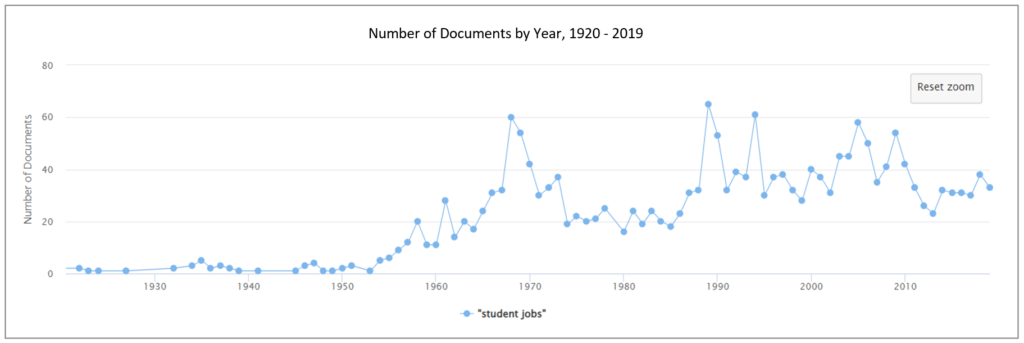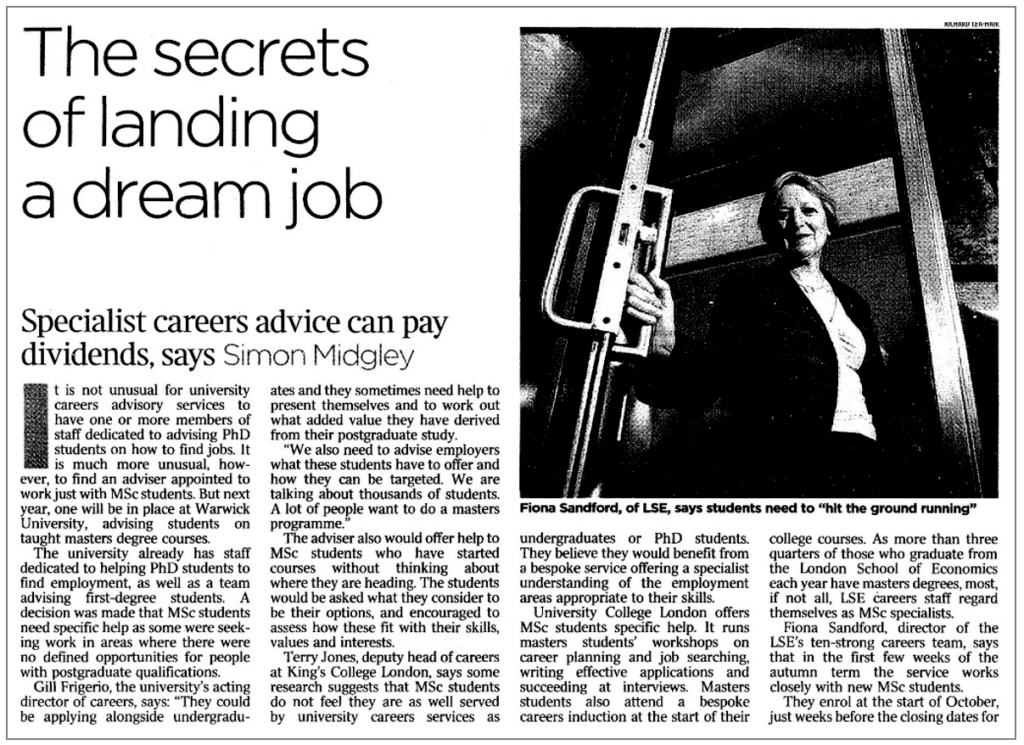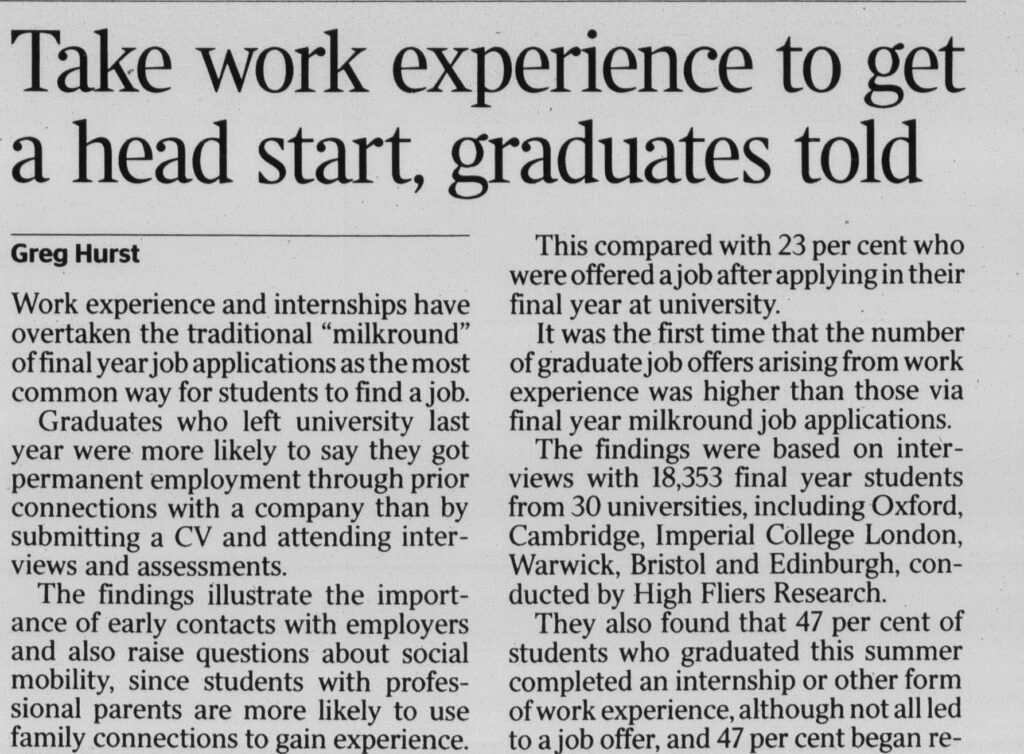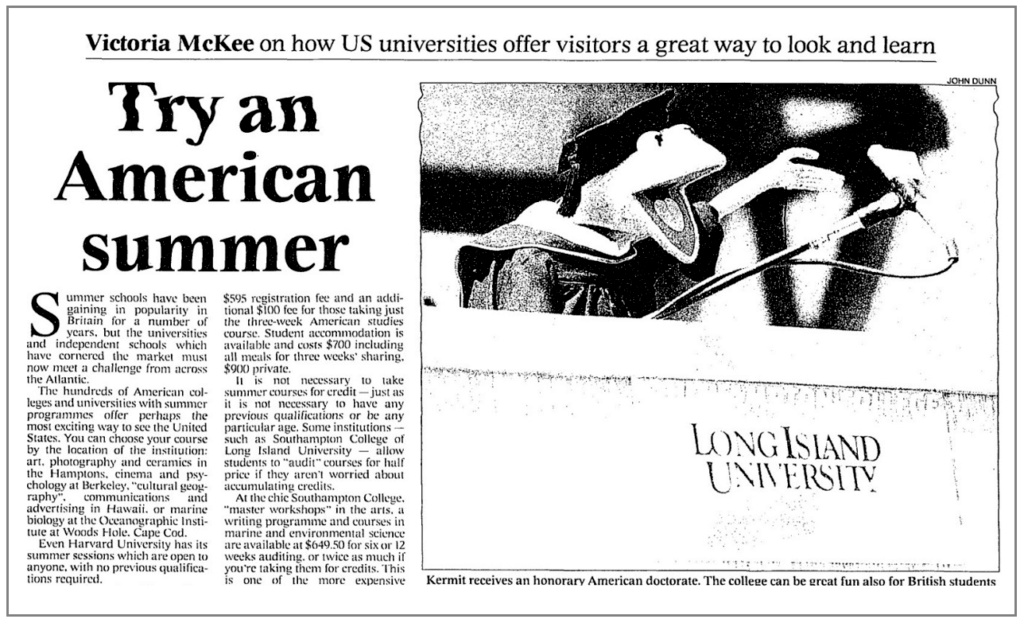│By Chloe Hooper , Gale Ambassador at the University of Glasgow│
Within every new cohort of students hurtling towards graduation, there will be many pondering the dreaded question: after university, what’s next? Chances are, if you’re reading this, you don’t have an answer to that question yet yourself. Career advice has long been a feature of the modern university experience, outlining the ways your degree can help you build a career. But Gale Primary Sources can help, too! Using The Times Digital Archive, undergraduates and postgraduates have access to decades of career advice geared towards finding the right job for each student. While the articles I examine below date from late the 1990s to the 2000s, many of the challenges facing graduates have stayed the same and much of the advice on overcoming them has stood the test of time.
One of the problems facing most students is that they don’t know how to discover what jobs are out there, particularly within the areas in which they’re interested or experienced. As a student, I had been using archives and archival services for years, but it never occurred to me that I could make a career out of it – or that it’s not just researchers driving digitisation projects, there are many other roles involved too, all of which are potential career pathways. It was actually reading through archives like The Times Digital Archive that helped me see this as a viable career option, and I am now studying Information Management and Preservation.
Am I the Only One?
Reflecting on my undergraduate years, my fellow students and I all thought the rest of the class had their career goals set. We all thought we were the only ones without a plan. Yet, a Term Frequency visualisation created using articles contained in The Times Digital Archive between 1920-2019 which feature the term ‘student jobs’ shows that this is a topic which has remained a concern and point of discussion within the publication from the 1960s to the present day. While there was a sudden rise in interest from 1965-1975, the fact that newspapers continue to feature articles on this subject demonstrates that this is an issue of consistent consideration and concern.

Think About the Skills You’ve Developed Through Coursework
A useful piece of advice all students should be made aware of comes from Simon Midgley’s 2008 article ‘The secrets of landing a dream job’. In this article, Midgley promotes the benefits specialised career advisors can have on students’ prospects. However, while Midgley discusses the learning opportunities that come with speaking to university career specialists, I believe the suggestion that students should start their job search by looking at their own studies should be the greatest takeaway. For Midgley, the goal is to encourage students to think critically about the skills they’re developing through their coursework – and for them to understand the many career paths alumni from their course have successfully embarked on.

Experience Can be Gained in Multiple Ways
However, a shared sentiment between Midgley’s ‘The Secrets of Landing a Dream Job’ published in 2008 and Hurst’s ‘Take Work Experience to Get a Head Start…’ from 2016 is their depiction of a competitive job market. In the eight years which separate the two features, it appears the job hunt hasn’t gotten any easier for graduates. Both authors stress the importance that it’s never too early to start thinking about your career goals, booking appointments with career advisors, or signing up for recruitment agencies.
Following a study that interviewed 18,353 Honours students, Hurst found that the key to most graduates finding a job was experience – something that has multiple benefits, as volunteering, work experience or a part-time job aren’t just great for networking, they also give students greater understanding about what jobs are out there, and what they’re best suited for. Like most students on my course, I originally considered doing a Master’s because I didn’t know what career I wanted. I never considered that volunteer work could be a new learning opportunity.

Don’t Worry About Getting It ‘Right’ First Time!
What isn’t mentioned in Midgley’s ‘…Landing a Dream Job’ or Hurst’s ‘Take Work Experience…’ is the reality that whichever career path you take initially, this will likely change over time. In her 2002 article ‘Students Stick to Principles’, McDonald references a questionnaire completed by 800 students which revealed most of them expected to change employers and be made redundant throughout their careers.
The Importance of Career Enjoyment
Interestingly, the same questionnaire revealed that most graduates also valued company ethics, and how much they enjoyed their job, over financial benefits. Following a case study, McDonald demonstrates the best way graduates can prove to be dedicated to performing a role is to follow their interests and consider the job search as just one step on the career journey. I believe pursuing one’s interests and getting enjoyment from your job is an essential part of all jobs, especially the archival work I plan to pursue. It’s a job that requires dedication, commitment, and significant challenges, with archivists expected to keep up to date with technology and changes to the law, so one must be passionate about the role to succeed.
![Macdonald, Susan. "Students stick to principles." Times, 31 Jan. 2002, p. 2[S1]. The Times Digital Archive](https://review.gale.com/wp-content/uploads/2022/12/Students-stick-to-principles.png)
Try New Things – Discover What’s on Your Doorstep
Just as McDonald stated, most students expect their career paths to change in the future, and many students will likely end up working in positions they didn’t know was an option when they were still studying. As well as networking and gaining experience, it can also be really useful to dedicate time to trying new things. Victoria Mckee’s advice to ‘Try an American Summer’ may not be a desired or plausible option for most students, but you don’t have to book any flights to explore what options are available in your region. For me, this meant talking with Glasgow-based archivists and volunteering with the University of Stirling archive department.

The Graduate Job Hunt Doesn’t Have to Be a Nightmare
An overwhelming sense of panic and uncertainty when it comes to figuring out your career pathway is an extremely common experience across the student body; this is a reality I definitely didn’t appreciate or believe during my own undergraduate years! Yet, while there are numerous advice articles on getting proactive about your career, it’s equally important to keep these aspirations and suggestions in tune with your own personal goals and interests. The last thing you want to do is rush down a career path simply because you think everyone else knows where they’re going. I was always confident about my research skills; now that I’m working behind the scenes with research resources, these are skills I can draw upon and consider more deeply when making digitised materials accessible online. In this way, I can pursue my own interests in a career tailored to indulging and exploring them.
The student job search doesn’t have to be a nightmare, it should be something to get excited about, and with decades of advice found in The Times Digital Archive, you don’t have to go in blind either. And finally, a really heartening thing to remember is that it isn’t just you looking for a job, numerous business and organisations across the world are also out looking for the right graduates to fill their vacancies!
If you found this career advice useful, check out our other top tips and student advice articles:
- Moving from Undergraduate to Postgraduate Study: Using Digital Archives More Proficiently
- How to Survive in the Jungle of Academia? Top Tips for University Freshers
- The COVID Impact: New Modes of Presenting Your PhD Research During a Pandemic
- The Potential and Importance of Interdisciplinarity in Academia
Blog post cover image citation: Image by George Milton “Thoughtful student using laptop at table with many different books, available on Pexels.com.


